
Chinese Idiom: 生灵涂炭 (Sheng Ling Tu Tan)
English Translation: Living beings in mud and fire
pīn yīn: shēng líng tú tàn
Idiom Meaning: This idiom describes the extreme suffering and dire situation of the common people under oppressive rule. “生灵” (shēng líng) refers to the people or living beings, while “涂炭” (tú tàn) denotes extreme hardship, symbolized by mud and burning coals.
Historical Source: in Shu (《晋书》), specifically the section on Fu Pi (苻丕) and Fu Jian (苻坚).
Idiom Story:
After Fu Jian, the king of the Former Qin dynasty, unified northern China, he aimed to conquer the entire country. In 382 AD, Fu Jian summoned his ministers in Chang’an to discuss an invasion of the Eastern Jin dynasty. Although a few ministers agreed with Fu Jian’s decision, most, including his brother Fu Rong, the crown prince Fu Hong, and his beloved concubine Lady Zhang, were opposed, believing that such a campaign would end in disaster.
Fu Jian had greatly trusted Wang Meng (also known as Wang Jinglue), a renowned statesman who had helped him unify the north. Wang Meng had once advised Fu Jian not to seek the destruction of the Jin dynasty, hoping that Fu Jian would heed his advice even after Wang Meng’s death. Despite this, Fu Jian, blinded by his ambitions, ignored the warnings and proceeded with the campaign.
In the following year, Fu Jian led an army of 900,000 against the Jin dynasty but suffered a crushing defeat at the Battle of Feishui. Fu Jian barely escaped capture, while Fu Rong was killed. The Former Qin dynasty’s power weakened significantly. In 385 AD, Fu Jian faced attacks from the Later Yan and Later Qin, and his capital, Chang’an, was besieged. With no food available, cannibalism occurred among the besieged. Fu Jian was forced to retreat to Mount Wujang, where he was surrounded and eventually captured by the Later Qin’s leader, Yao Chang. Fu Jian and his followers were imprisoned in a Buddhist temple and executed.
After Fu Jian’s death, Wang Yong, the governor of Youzhou and an ally of Fu Jian’s son Fu Pi, declared Fu Pi as the new emperor. Wang Yong was appointed as the Left Chancellor. In a proclamation against the Later Qin, Wang Yong described the dire situation: “The late emperor was murdered by the rebel court, the capital is occupied by rebels, the country is in ruins, and the people suffer as if they are living in mud and fire.”
Despite Wang Yong’s efforts, the Former Qin forces were ultimately defeated by the Later Qin, and the Former Qin dynasty was destroyed by 394 AD.






